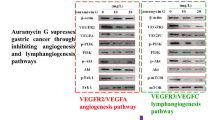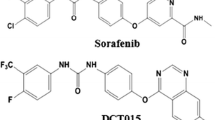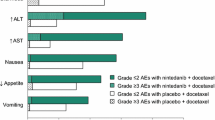Abstract
The novel isocoumarin 2-(8-hydroxy-6-methoxy-1-oxo-1 H-2-benzopyran-3-yl) propionic acid (NM-3) has completed phase I clinical evaluation as an orally bioavailable angiogenesis inhibitor. NM-3 directly kills both endothelial and tumor cells in vitro at low mM concentrations and is effective in the treatment of diverse human tumor xenografts in mice. The present work has assessed the activity of NM-3 against human non-small-cell lung cancer (NSCLC) cells when used alone and in combination with docetaxel. The results demonstrate that NM-3 decreases clonogenic survival of NSCLC cells at clinically achievable concentrations. The results also demonstrate that NM-3 is effective in the treatment of NSCLC (A549, NCI-H460) tumor xenografts in mice. Moreover, NM-3 potentiated the antitumor activity of docetaxel against NSCLC xenografts without increasing toxicity. Our findings indicate that NM-3 may be effective alone or in combination with docetaxel in the treatment of patients with NSCLC.




Similar content being viewed by others
References
Soulie P, Gamelin E, Eder J (2003) A dose finding study of an oral antiangiogenesis inhibitor, NM-3 safety profile and effects on surrogate markers with once-daily dosing. Abstract No. 777. Proc Am Soc Clin Oncol 22:194
Bonate P, Eder J, Soulie P (2003) Pharmacokinetics of a new antiangiogenic isocoumarin derivative, NM-3 in two oral once a day-dose schedules with escalating doses. Abstract No. 537. Proc Am Soc Clin Oncol 22:132
Nakashima T, Hirano S, Agata N, Kumagai H, Isshiki K, Yoshioka T, Ishizuka M, Maeda K, Takeuchi T (1999) Inhibition of angiogenesis by a new isocoumarin, NM-3. J Antibiot 52:426–428
Salloum R, Jaskowiak N, Mauceri H, Seetharam S, Beckett M, Koons A, Hari D, Gupta V, Reimer C, Kalluri R, Posner M, Hellman S, Kufe D, Weichselbaum R (2000) NM-3, an isocoumarin, increases the antitumor effects of radiotherapy without toxicity. Cancer Res 60:6958–6963
Reimer C, Agata N, Tammam J, Bamberg M, Dickerson W, Kamphaus G, Rook S, Milhollen M, Fram R, Kalluri R, Kufe D, Kharbanda S (2002) Antineoplastic effects of chemotherapeutic agents are potentiated by NM-3, an inhibitor of angiogenesis. Cancer Res 62:789–795
Yin L, Ohno T, Weichselbaum R, Kharbanda S, Kufe D (2001). The novel isocoumarin NM-3 induces lethality of human carcinoma cells by generation of reactive oxygen species. Mol Cancer Ther 1:43–48
Shepherd FA, Dancey J, Ramlau R, Mattson K, Gralla R, O’Rourke M, Levitan N, Gressot L, Vincent M, Burkes R, Coughlin S, Kim Y, Berille J (2000) Prospective randomized trial of docetaxel versus best supportive care in patients with non-small-cell lung cancer previously treated with platinum-based chemotherapy. J Clin Oncol 18:2095–2103
Agata N, Tsuchiya A, Issihiki K (2001) NM-3, a novel orally bioavilable antiangeiogenic agents suppresses hypoxia-induced vascular endothelial growth factor (VEGF) in human fibroblasts and tumor cells. Proc AACR 41:587
Acknowledgements
This work was supported in part by Grants CA98628 and CA29431 awarded by the National Cancer Institute. D.K. has a financial interest in ILEX.
Author information
Authors and Affiliations
Corresponding author
Rights and permissions
About this article
Cite this article
Agata, N., Nogi, H., Bamberg, M. et al. The angiogenesis inhibitor NM-3 is active against human NSCLC xenografts alone and in combination with docetaxel. Cancer Chemother Pharmacol 56, 610–614 (2005). https://doi.org/10.1007/s00280-005-1013-4
Received:
Accepted:
Published:
Issue Date:
DOI: https://doi.org/10.1007/s00280-005-1013-4




